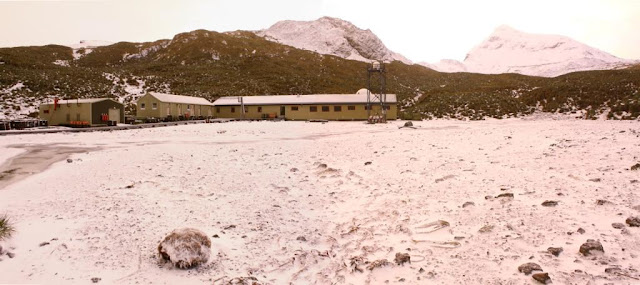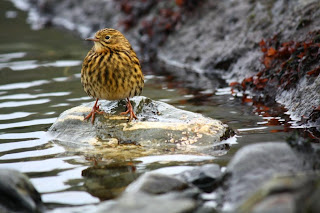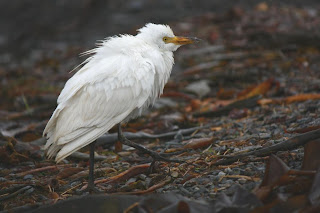
Monday, 20 June 2011
Tuesday, 7 June 2011
Batten down the hatches
The onset of wintery weather on Bird Island is a rather gradual affair. For most of the summer the air temperature hovered around 5°C, but it has been slowly falling over the last few months and is now hovering around 0°C. When it drops below zero for a few days in a row the whole island freezes up; the streams freeze solid, the ground turns to iron and the pools of mud become concealed by a layer of ice, which gives way when you step on it and plunges your leg into the cold goop below. Then a few days later the temperature will be back up to, say, 0.4°C and everything melts again.
Many of the summer residents of the island have now departed, to spend winter in the warmer waters to the north. The macaroni penguin colonies are empty, and we will not see another mac now until October (macs are very punctual – the chart on the wall by my desk says that they will come back on the 17th October and I have no doubt that they will be here on exactly that date). The gentoo penguins stay with us all winter though, and can be always be found loafing about on the beaches. Most of the fur seals have left, but there are always a few seals around to growl and huff at you as you walk past them. The cool winter weather also brings leopard seals further north, and these huge and fearsome predators often haul out on the beaches of Bird Island for a little snooze. Leopard seals can reach 3.5 metres in length and have teeth like an alligator, so a sleeping leopard seal is best left alone.
The black-browed and grey-headed albatross colonies are also emptying rapidly. Chicks began fledging in April and there are now only a few late-developers left. Like the macaroni penguins, the adult albatrosses disappear over winter and will not return until the start of next summer. Not so the wanderers, however. The wandering albatross chicks, which hatched at the beginning of winter, are now large enough to be left on their own, and consequently the island is covered in little, grey, fluffy bundles, perched on top of their pedestal nests. The adults return regularly to feed them a nutritious meal of semi-digested squid. Quite how these tiny, vulnerable chicks survive the onslaught of winter rain, snow and high winds remains a mystery to me.
Because there are fewer animals around the workload for us field assistants is significantly reduced compared to the summer months. Winter is therefore a time for us to catch up with some lab work. For me there are two main lab jobs to keep me busy. One is sorting all the beach debris that has been collected over the summer. Throughout the year we collect anything man-made that washes up on the beach at Main Bay, and then each item is weighed, measured and categorized, and the data is sent to CCAMLR (Convention on the Conservation of Antarctic Marine Living Resources) as part of a global programme monitoring how much trash there is floating around Antarctica. Most of what we find is plastic packaging and old fishing gear, but sometimes more unusual objects turn up. Last year a whole wooden chair appeared on the beach. My other lab job is analysing penguin diet samples that were collected in the summer. Any krill that were found in the samples have to be measured, aged and sexed by examining them under a microscope. Sexing and ageing a partially digested krill is no picnic, I can tell you, but after doing several hundred I think I’m getting better at separating the men from the boys, and indeed the boys from the girls.
Another winter task, and one which everyone on base gets involved in, is the monthly census of wandering albatross nests. This involves counting every active nest on the island in a single day, and is big job when there are just four of us here to do it. Usually one person has to stay on base at all times, in case of an emergency, but on albatross census day this is not possible, so to reduce the risk of a fire starting while we are out and destroying the base we have to turn off the generators – meaning that the electricity, heating and communications all go off as well.
Our most recent albatross census day began quite nicely. We shut down the base and all went our separate ways to count albatrosses. The weather was pretty good – overcast as usual but dry and with very little wind, a perfect day for meandering around the island. However, after about three hours of tramping up and down hills looking for nests I was beginning to get a little tired, and the wind had started to pick up. I had reached a point where I needed to take a large detour to check on four nests that were outside the main colonies. The wind was getting stronger by the minute, but behind me at this stage, so I set off to find them. It was only when I turned round to head back to my original location that I realised just how ferocious the wind had become. Walking into it was difficult, and it had started to rain a sleety rain which lashed painfully into my face. I held my clipboard up in front of my face to shield me from the stinging rain and continued on. The clipboard arrangement was not ideal, however. Every so often the wind would catch hold of it and I would end up smacking myself in the face. It also made navigation rather more difficult and I soon became disorientated and ended up falling into a bog. Cursing, I pulled myself out and headed towards the final cluster of albatross nests that I needed to check. This last section was located on Wanderer Ridge Extension, and exposed headland that juts out into the sea. There are not many nests in this area, but there would also be no protection from the wind, which was now howling like some demented animal. I huddled momentarily in a sheltered spot to gather my strength and then gingerly climbed round the sheltered side of Wanderer Ridge Extension and emerged at the top into what appeared to be a hurricane. The wind ripped at my clothes and I was pummelled and pelted with rain. With every step I took I was knocked off balance and sent pitching into the tussock. There were treacherous muddy pools everywhere and it took all my strength to avoid being blown into them. The only option was to crawl everywhere on hands and knees. So in this way I clawed and floundered my way round the last few nests until finally, thankfully, they were all done.
I crouched in a ditch for a while to rest before attempting the walk home. Luckily I was not far from base and the journey back was made a little easier by walking along more sheltered streambeds. I half expected everyone else to be home already and me to receive a hero’s welcome as a hot mug of tea was pressed into my hand, but in fact I was the first one back and everyone else was still out in the maelstrom, and the lashing rain had now turned into lashing snow. I turned the generators back on and settled down to a restorative cup of tea. About half an hour later Mick turned up looking slightly shell-shocked.
“I was on Goldcrest Point when it hit...” he muttered, as though we had been receiving enemy fire rather than having a bit of a windy day.
He radioed the others to check that they were OK and suggested that they abandon the albatross census for today, an idea to which everyone readily agreed. We spent the rest of the afternoon drinking tea and swapping war stories, as the windows filled up by snow and the building quivered in the wind.
“I could hardly stand up!”
“The rain stung my eyes ‘til I couldn’t see!”
“I was so cold I couldn’t move my fingers!”
For once we felt like proper Antarctic heroes. Not quite in the same league as Amundsen and Shackleton of course, but brave and courageous, nonetheless, in the execution of our albatross counting duties.
The base with a light dusting of snow.
Icicles.
'Icle icicles.
The snowy mountains of South Georgia, seen through Natural Arch.
A geep wonders why swimming has suddenly become so difficult.
Frozen kelp.
Many of the summer residents of the island have now departed, to spend winter in the warmer waters to the north. The macaroni penguin colonies are empty, and we will not see another mac now until October (macs are very punctual – the chart on the wall by my desk says that they will come back on the 17th October and I have no doubt that they will be here on exactly that date). The gentoo penguins stay with us all winter though, and can be always be found loafing about on the beaches. Most of the fur seals have left, but there are always a few seals around to growl and huff at you as you walk past them. The cool winter weather also brings leopard seals further north, and these huge and fearsome predators often haul out on the beaches of Bird Island for a little snooze. Leopard seals can reach 3.5 metres in length and have teeth like an alligator, so a sleeping leopard seal is best left alone.
A gentoo, loafing.
The amazing two-headed, four-flippered penguin.
Seals enjoying their winter holidays.
Do not attempt to cuddle: a leopard seal.
A lep dozes by the jetty.
In winter the South Georgia pipits forage for little beasties on the seashore.
Cattle egrets get everywhere!
The black-browed and grey-headed albatross colonies are also emptying rapidly. Chicks began fledging in April and there are now only a few late-developers left. Like the macaroni penguins, the adult albatrosses disappear over winter and will not return until the start of next summer. Not so the wanderers, however. The wandering albatross chicks, which hatched at the beginning of winter, are now large enough to be left on their own, and consequently the island is covered in little, grey, fluffy bundles, perched on top of their pedestal nests. The adults return regularly to feed them a nutritious meal of semi-digested squid. Quite how these tiny, vulnerable chicks survive the onslaught of winter rain, snow and high winds remains a mystery to me.
Black-browed albatross chicks, looking indignant.
A black-brow chick, almost ready to go.
This is a rare 'isabelline' black-brow chick, it has a genetic mutation that makes it look like its been through the wash a few too many times.
A grumpy, partially moulted giant petrel chick.
A fully-grown giant petrel chick begs for food from a less than enthusiastic adult. This chick fledged a couple of days later.
Even when not breeding, the geeps build 'practice' nests.
Wandering albatrosses literally put their kids on a pedestal.
A pair of wanderers, chillin'.
Sugar-frosted albatross chick.
Because there are fewer animals around the workload for us field assistants is significantly reduced compared to the summer months. Winter is therefore a time for us to catch up with some lab work. For me there are two main lab jobs to keep me busy. One is sorting all the beach debris that has been collected over the summer. Throughout the year we collect anything man-made that washes up on the beach at Main Bay, and then each item is weighed, measured and categorized, and the data is sent to CCAMLR (Convention on the Conservation of Antarctic Marine Living Resources) as part of a global programme monitoring how much trash there is floating around Antarctica. Most of what we find is plastic packaging and old fishing gear, but sometimes more unusual objects turn up. Last year a whole wooden chair appeared on the beach. My other lab job is analysing penguin diet samples that were collected in the summer. Any krill that were found in the samples have to be measured, aged and sexed by examining them under a microscope. Sexing and ageing a partially digested krill is no picnic, I can tell you, but after doing several hundred I think I’m getting better at separating the men from the boys, and indeed the boys from the girls.
Pieces of fishing line that washed up on the beach.
Some bits of beach debris are too big to collect. This young elephant seal is cuddled up to an enormous piece of timber that washed ashore.
A scientician, hard at work.
Anyone for prawn cocktail?
Three months into winter and our fresh fruit and veg supply is beginning to get a bit mouldy (it's a cabbage).
The same cabbage after some careful peeling. Amazingly it was still edible!
Another winter task, and one which everyone on base gets involved in, is the monthly census of wandering albatross nests. This involves counting every active nest on the island in a single day, and is big job when there are just four of us here to do it. Usually one person has to stay on base at all times, in case of an emergency, but on albatross census day this is not possible, so to reduce the risk of a fire starting while we are out and destroying the base we have to turn off the generators – meaning that the electricity, heating and communications all go off as well.
Our most recent albatross census day began quite nicely. We shut down the base and all went our separate ways to count albatrosses. The weather was pretty good – overcast as usual but dry and with very little wind, a perfect day for meandering around the island. However, after about three hours of tramping up and down hills looking for nests I was beginning to get a little tired, and the wind had started to pick up. I had reached a point where I needed to take a large detour to check on four nests that were outside the main colonies. The wind was getting stronger by the minute, but behind me at this stage, so I set off to find them. It was only when I turned round to head back to my original location that I realised just how ferocious the wind had become. Walking into it was difficult, and it had started to rain a sleety rain which lashed painfully into my face. I held my clipboard up in front of my face to shield me from the stinging rain and continued on. The clipboard arrangement was not ideal, however. Every so often the wind would catch hold of it and I would end up smacking myself in the face. It also made navigation rather more difficult and I soon became disorientated and ended up falling into a bog. Cursing, I pulled myself out and headed towards the final cluster of albatross nests that I needed to check. This last section was located on Wanderer Ridge Extension, and exposed headland that juts out into the sea. There are not many nests in this area, but there would also be no protection from the wind, which was now howling like some demented animal. I huddled momentarily in a sheltered spot to gather my strength and then gingerly climbed round the sheltered side of Wanderer Ridge Extension and emerged at the top into what appeared to be a hurricane. The wind ripped at my clothes and I was pummelled and pelted with rain. With every step I took I was knocked off balance and sent pitching into the tussock. There were treacherous muddy pools everywhere and it took all my strength to avoid being blown into them. The only option was to crawl everywhere on hands and knees. So in this way I clawed and floundered my way round the last few nests until finally, thankfully, they were all done.
I crouched in a ditch for a while to rest before attempting the walk home. Luckily I was not far from base and the journey back was made a little easier by walking along more sheltered streambeds. I half expected everyone else to be home already and me to receive a hero’s welcome as a hot mug of tea was pressed into my hand, but in fact I was the first one back and everyone else was still out in the maelstrom, and the lashing rain had now turned into lashing snow. I turned the generators back on and settled down to a restorative cup of tea. About half an hour later Mick turned up looking slightly shell-shocked.
“I was on Goldcrest Point when it hit...” he muttered, as though we had been receiving enemy fire rather than having a bit of a windy day.
He radioed the others to check that they were OK and suggested that they abandon the albatross census for today, an idea to which everyone readily agreed. We spent the rest of the afternoon drinking tea and swapping war stories, as the windows filled up by snow and the building quivered in the wind.
“I could hardly stand up!”
“The rain stung my eyes ‘til I couldn’t see!”
“I was so cold I couldn’t move my fingers!”
For once we felt like proper Antarctic heroes. Not quite in the same league as Amundsen and Shackleton of course, but brave and courageous, nonetheless, in the execution of our albatross counting duties.
Stormy winter seas.
The jetty on a snowy day.
Ice, ice baby.
Subscribe to:
Comments (Atom)
































